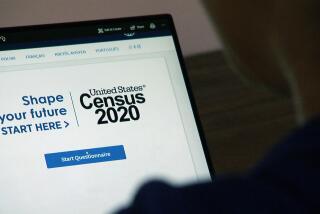Op-Ed: California would be the primary victim in a GOP war on the census
The 2020 census is headed for a debacle, and California is among the states most likely to be victimized by it.
Every 10 years, the Constitution requires the federal government to “enumerate” the nation’s residents. The count — traditionally accomplished by mailed questionnaires and house visits — determines political apportionment and the allocation of federal funds for the next decade.
The problems faced by the 2020 census begin with its unrealistically low budget. At mostly Republican insistence, it is set at the same level as the 2010 census budget, so it doesn’t account for a decade’s worth of inflation, or for population growth — and there will be an estimated 25 million more people in the U.S. by 2020. On top of that, the Census Bureau is using new technology to reduce door-to-door counting, and thanks to the bureau’s meager funding, it is far behind on testing it.
The 2020 census’ predicament is dire enough that in February, the Government Accountability Office added the census to its “high-risk list” of vulnerable agencies and programs. Then in June, the Census Bureau’s director abruptly resigned without explanation. Strong leadership in the buildup to a census is vital, but the Trump administration still has not named a successor.
One indication of the importance of an accurate census is the diversity of the groups supporting it.
An inaccurate census errs in predictable ways. It leaves out the people who are hardest to count — those who aren’t at fixed addresses or simply don’t respond — a disproportionate number of whom are poor or minorities. On the other hand, whites, particularly multiple-home owners, are likely to be overcounted. Growing distrust of the government, now heightened among immigrants who fear deportation, probably will make the 2020 undercount even bigger.
The last census was considered successful — that is, the 2010 results were considered to be within an acceptable margin of error. But by the Census Bureau’s own estimates, it omitted 2.1% of African Americans, 1.5% of Latinos and nearly 5% of reservation-dwelling American Indians, while non-Latino whites were overcounted by almost 1%. The census missed about 7% of African American and Latino children 4 or younger, a rate twice as high as the overall average for young children.
Because California is the nation’s most populous state and home to a disproportionate number of the hard-to-count, it will suffer serious consequences if the margin of error, and the size of the undercount, increases. The state could be deprived of a deserved additional congressional seat, and it will lose tens of billions of dollars per year from its fair share of federally funded programs ranging from Medicaid to Head Start to highway construction. (According to the state Finance Department, this already happened in 2010; by the department’s calculations, the Census Bureau missed 1.5 million Californians, perhaps enough to deny us a new House member.)
An inaccurate census also makes companies that rely on the bureau’s data less efficient as they make investments, plan marketing campaigns and choose sites for new factory and office buildings. And because the census helps determine not just Congressional districts but the boundaries of state and county legislative and even school board districts, inaccuracies reverberate deep inside states, skewing political outcomes at the expense of minorities, immigrants and the poor at every level of government.
One indication of the importance of an accurate census is the diversity of the groups supporting it — the coalition obliterates the red-versus-blue political divide. The nonpartisan Census Project, which campaigns for an accurate census on behalf of about 200 organizations, includes among its members the U.S. Chamber of Commerce, the National Assn. of Realtors, the U.S. Conference of Mayors, the National Assn. of Counties, the American-Arab Anti-Discrimination Committee and the Mexican American Legal Defense and Educational Fund.
The Census Project’s affiliation with pro-business, pro-GOP groups makes the party’s current indifference to the census’ accuracy particularly striking. It appears that Republicans prefer a deeply flawed census despite its negative impacts on businesses because greater accuracy would increase the number — and clout — of minorities and poor people, who are most likely Democratic voters.
Republicans have fought an accurate census since the mid-1980s, when they first opposed “statistical sampling,” a mathematical process proposed by the Census Bureau to make up for the undercount. In a famous 1997 memo to local Republican officials, Republican National Committee Chairman Jim Nicholson calculated that if the 2000 census were corrected using sampling, it would “add nearly four and one-half million Democrats to the nation’s population” and would cause Republicans to lose “24 Congressional seats, 113 state senate seats, and 297 state house seats nationwide.”
The Census Bureau abandoned its plan to correct the count via sampling after House Republicans challenged it, and prevailed, in the Supreme Court. (The bureau uses sampling to make its post-enumeration accuracy estimates, but those findings can’t be used for the official census.)
In the last decade, Republicans have gone further in their war against good data by denying the bureau essential funding. For 2018, the GOP Congress is budgeting 10% less than what the Obama administration thought would be required two years out from the next census, and that was before the real costs of new technology were known.
As with climate change, healthcare and many other issues, the Republicans have dealt with the census by suppressing or ignoring data that threatens their policies or electoral prospects — they’re the party that doesn’t want to know. That their obstructions will hurt California, bluest of blue states, isn’t a concern. For the GOP, it’s the point.
Jacques Leslie is a contributing writer for Opinion.
Follow the Opinion section on Twitter @latimesopinionand Facebook
More to Read
A cure for the common opinion
Get thought-provoking perspectives with our weekly newsletter.
You may occasionally receive promotional content from the Los Angeles Times.










